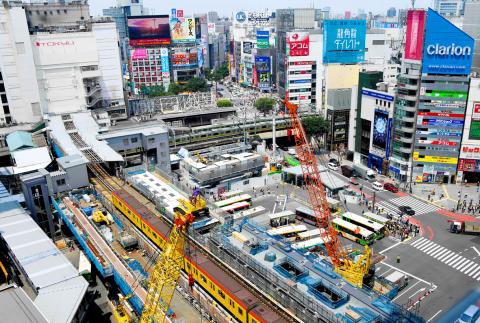Confidence among Japan’s biggest manufacturers has risen for the third straight quarter to the best level in more than three years, a key central bank survey showed yesterday as exports continue to grow.
The Bank of Japan’s Tankan report — a quarterly survey of more than 10,000 companies — showed a reading of 17 among major manufacturers, the highest since the first quarter of 2014.
The key index, which rose from 12 in the previous survey, also beat market expectations of a result around 15.

Photo: AFP
The better-than-expected Tankan would normally be good news for Japanese Prime Minister Shinzo Abe, who has been trying to revitalize Japan’s economy.
However, the results came a day after his Liberal Democratic Party suffered a crushing defeat in elections for the Tokyo municipal assembly. The vote was seen as a barometer of current public sentiment toward his government, which has been beset by a series of scandals that have dented its support.
Abe swept to power in late 2012 on a pledge to cement a lasting recovery in the world’s third-largest economy with a growth plan eponymously dubbed Abenomics. The scheme — a mix of aggressive monetary easing and huge government spending along with reforms to the economy — stoked a stock market rally as it weakened the yen and fattened corporate profits, but the effect on the wider economy has been less dramatic.
The country’s prospects have been improving on the back of strong exports, with investments linked to the Tokyo 2020 Olympics also giving the economy a shot in the arm.
“The jump in the Tankan’s headline index for large manufacturers suggests that economic activity accelerated last quarter,” Capital Economics senior Japan economist Marcel Thieliant said.
“Capacity shortages have intensified and manufacturers are reporting the smallest declines in output prices since 2008,” he wrote in a commentary.
The latest survey also showed the average currency exchange rate expected by large manufacturers came in at ¥108.31 to the US dollar for the year to March next year, much stronger than current market rates.
As the actual rate is currently around ¥112, “there appears to be room for sentiment to improve further, especially in manufacturing, in the September survey,” economists Yuichiro Nagai and Yukito Funakubo of Barclays said in a research note.
A weaker currency is positive for Japanese exporters as it makes their products more competitive abroad and inflates repatriated profits.
The Tankan, closely watched for being the broadest indicator of how Japan Inc is faring, marks the difference between the percentage of firms that are upbeat and those that see conditions as unfavorable.
The latest report comes after a batch of government data on Friday showed inflation ticked up in May, but weak spending underlined the challenges still facing Tokyo’s battle to ramp up prices and slay years of on-off deflation.
The index for non-manufacturers rose to 23 from 20 in the previous Tankan, reaching the highest level since the final quarter of 2015.

BYPASSING CHINA TARIFFS: In the first five months of this year, Foxconn sent US$4.4bn of iPhones to the US from India, compared with US$3.7bn in the whole of last year Nearly all the iPhones exported by Foxconn Technology Group (富士康科技集團) from India went to the US between March and last month, customs data showed, far above last year’s average of 50 percent and a clear sign of Apple Inc’s efforts to bypass high US tariffs imposed on China. The numbers, being reported by Reuters for the first time, show that Apple has realigned its India exports to almost exclusively serve the US market, when previously the devices were more widely distributed to nations including the Netherlands and the Czech Republic. During March to last month, Foxconn, known as Hon Hai Precision Industry

Taiwan Semiconductor Manufacturing Co (TSMC, 台積電) and the University of Tokyo (UTokyo) yesterday announced the launch of the TSMC-UTokyo Lab to promote advanced semiconductor research, education and talent development. The lab is TSMC’s first laboratory collaboration with a university outside Taiwan, the company said in a statement. The lab would leverage “the extensive knowledge, experience, and creativity” of both institutions, the company said. It is located in the Asano Section of UTokyo’s Hongo, Tokyo, campus and would be managed by UTokyo faculty, guided by directors from UTokyo and TSMC, the company said. TSMC began working with UTokyo in 2019, resulting in 21 research projects,

Ashton Hall’s morning routine involves dunking his head in iced Saratoga Spring Water. For the company that sells the bottled water — Hall’s brand of choice for drinking, brushing his teeth and submerging himself — that is fantastic news. “We’re so thankful to this incredible fitness influencer called Ashton Hall,” Saratoga owner Primo Brands Corp’s CEO Robbert Rietbroek said on an earnings call after Hall’s morning routine video went viral. “He really helped put our brand on the map.” Primo Brands, which was not affiliated with Hall when he made his video, is among the increasing number of companies benefiting from influencer

Quanta Computer Inc (廣達) chairman Barry Lam (林百里) yesterday expressed a downbeat view about the prospects of humanoid robots, given high manufacturing costs and a lack of target customers. Despite rising demand and high expectations for humanoid robots, high research-and-development costs and uncertain profitability remain major concerns, Lam told reporters following the company’s annual shareholders’ meeting in Taoyuan. “Since it seems a bit unworthy to use such high-cost robots to do household chores, I believe robots designed for specific purposes would be more valuable and present a better business opportunity,” Lam said Instead of investing in humanoid robots, Quanta has opted to invest